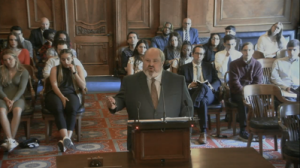Illinois Supreme Court hears information act case involving gun records
 Send a link to a friend
Send a link to a friend
 [September 21, 2023]
By Greg Bishop | The Center Square [September 21, 2023]
By Greg Bishop | The Center Square
(The Center Square) – The intersection of Illinois’ Firearm Owner’s
Identification card and the Freedom of Information Act was the focus of
an Illinois Supreme Court case heard this week.
The case stems from two people requesting public records regarding why
their FOID cards, a state-issued identification required in Illinois to
own or buy firearms and ammunition, were either revoked or suspended.
The plaintiffs’ FOIA requests to Illinois State Police were denied.
After challenges, the case made it to the Illinois Supreme Court on
Tuesday.
Illinois State Police attorney Valerie Quinn said that they can’t
release such personal information through FOIA and the proper way to
request such information is through the Firearms Services Bureau.
“No one is trying to keep people’s personal applications and denial
letters a secret from them but the Firearms Services Bureau needs to be
able to verify that you are who you say you are before releasing copies
of your confidential information,” Quinn said.
Quinn said one reason FOID card information is protected is because of
previous cases where news media attempted FOIA requests to get all FOID
card data was blocked.

[to top of second column]
|

Attorney Thomas Maag in front of the Illinois Supreme Court. - Blue
Room Stream

“FOIA is for monitoring what the government is up to, not for keeping
tabs on what private citizens are up to,” Quinn said.
Representing the plaintiffs, attorney Thomas Maag said going through the
FSB isn’t conducive.
“They don’t answer the telephone for hours at a time. They don’t answer
emails for days and or weeks at a time,” Maag said. “I invite this court
to go to their website and dial the telephone number and see how many
hours it takes to get a person, if you even can.”
They’re not a third party seeking their own address or other personal
information, Maag said.
“They do want to be told what the stated reason they’re not being
allowed to have a FOID card and thus exercise their Second Amendment
rights is so that they can determine whether or not they can challenge
that or not,” Maag said.
The justices took the case under advisement. |